

Table of Contents
- About Jewar Airport: Noida International Airport
- Jewar Airport Noida Details
- Jewar Airport Noida News Highlights
- Jewar Airport Noida Important Dates & Events
- Jewar Airport Noida Connectivity
- Jewar Airport Noida Distance from Nearby Cities in NCR
- Upcoming Connectivity Solutions for Jewar Airport
- Jewar Airport Noida Phase 1 Layout Plan
- Jewar Airport Noida Phase 2 Layout Plan
- Jewar Airport Noida Phase 3 Layout Plan
- Jewar Airport Noida Phase 4 Master Plan
- Jewar Airport Noida Receives IATA Code 'DXN'
- Jewar Airport Noida to be India's Largest Six-Runway Hub
- Jewar Airport Noida: Investing in Plots
- YEIDA's Plan for Aerotropolis near Jewar Airport
- Top Hotels Near Jewar Airport Noida
- Contact Information for Jewar International Airport
- Conclusion
- Faq's
About Jewar Airport: Noida International Airport
The Government of Uttar Pradesh has envisioned the development of a greenfield airport at Jewar, to significantly enhance regional connectivity and economic opportunities. This airport project is expected to link cities such as Agra, Mathura, Gautam Buddh Nagar, and others to the global aviation network, providing a vital gateway for business and tourism.
The establishment of the Jewar Airport is poised to bring about several key benefits to the region. Improved air connectivity will facilitate easier access for industries in the hinterland to global value chains, fostering industrialization and economic growth. The integration of these industries with international markets will create new opportunities and enhance competitiveness.
Furthermore, the enhanced air connectivity is expected to boost the tourism sector significantly. By attracting more visitors to existing tourist destinations and creating opportunities for the development of new centers, the airport will contribute to the growth of tourism-related businesses and infrastructure.
Another critical aspect of the Jewar Airport project is its role in alleviating congestion at the Indira Gandhi International (IGI) Airport in Delhi. With IGI Airport nearing its capacity, Jewar Airport's development comes at a crucial time, providing an alternative and relieving pressure on Delhi's air transport infrastructure.
The airport's development model involves a public-private partnership (PPP), ensuring collaboration between government entities and private investors for efficient project execution and management. The initial phase aims to construct a two-runway airport by 2024, with plans for future expansion into a larger six-runway airport spanning 7,200 acres. Prime Minister Narendra Modi's involvement in laying the foundation stone underscores the project's national significance and commitment to infrastructure development.
YEIDA has allocated a substantial area of 5,100 hectares for the airport project, reflecting the scale and ambition of this initiative. Zurich Airport International AG's selection as the concessionaire and developer further emphasizes the project's international standards and expertise.
The expected operational timeline of 2024 for Jewar Airport is strategically planned, ensuring readiness ahead of IGI Airport's anticipated traffic handling capacity threshold. This forward-looking approach aims to establish Jewar Airport as a modern, efficient, and pivotal hub in India's aviation landscape.
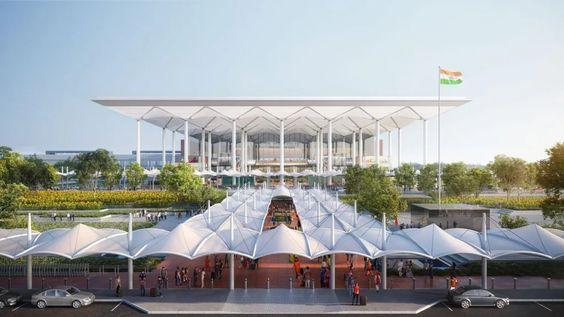 Proposed Noida International Airport
Proposed Noida International Airport
Image source: Pinterest
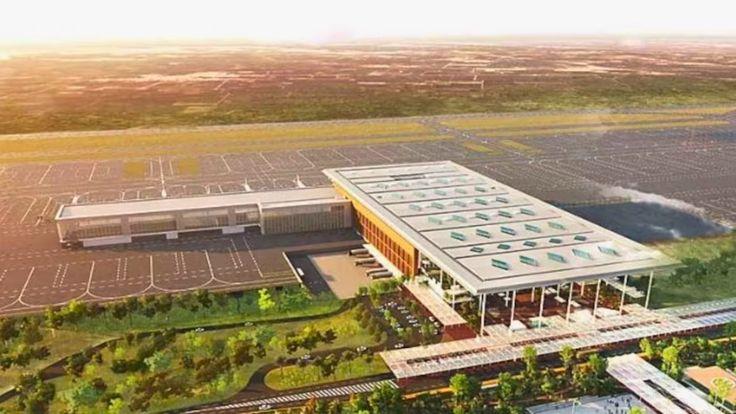 Jewar Airport Food Facilities
Jewar Airport Food Facilities
Image source: Pinterest
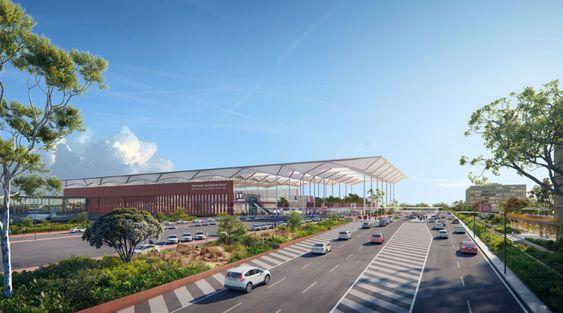 Airport Design
Airport Design
Image source: Pinterest
Jewar Airport Noida Details
- Airport Names: Noida International Airport, Jewar Airport
- Location: Jewar, Gautam Buddha Nagar District, Uttar Pradesh, India
- Construction Start Date: June 2022
- Opening Date (Phase 1): December 2024
- Airport Code: DXN
- Owned By: Noida International Airport Limited (NIAL)
- Operated By: Yamuna International Airport Private Limited (YIAPL)
- Airport Type: Public
- Airport Status: Under Construction
- Airport Cost: Rs. 29,650 Crore
- Airport Area: 1334 Hectares
- Number of Terminals: 4 Terminals
- Number of Runways: 6 Runways
- Runway Length: 4 Km
Jewar Airport Noida News Highlights
- DVOR Calibration Flight Test: On April 18, 2024, Jewar Airport Noida conducted its first DVOR (Doppler Very High Frequency Omni Range) calibration flight test. This crucial test evaluated the functionality and accuracy of the airport's navigation systems, ensuring they meet industry standards for safe and efficient air navigation.
- Operational Phase Progress: The first phase of Jewar Airport Noida is on track to become operational by December 2024. This milestone marks a significant step forward in the airport's development, gearing up to serve passengers and airlines with modern facilities and services.
- Ground Handling Agreement: In a strategic move, Noida Airport has entered into an agreement with the Bird Group for ground handling services. This agreement encompasses a range of services, including baggage handling, passenger assistance, and efficient ramp operations. Such partnerships are crucial for ensuring smooth airport operations and a positive experience for travelers.
A Jewar Airport official shared insights on Twitter, highlighting the successful DVOR calibration flight and the airport's commitment to operational excellence. The calibration flight, conducted using the Beechcraft King Air B300 aircraft, signifies the meticulous approach taken by Noida International Airport Authorities to ensure that all navigation equipment, managed in partnership with the Airports Authority of India (AAI), functions seamlessly.
The agreement with the Bird Group underscores Jewar Airport's focus on comprehensive ground handling services, which play a vital role in the overall efficiency and passenger satisfaction of an airport.
These developments demonstrate Jewar Airport Noida's readiness and commitment to meeting international aviation standards while creating a robust and passenger-friendly airport environment. As the operational launch approaches, stakeholders and travelers can anticipate a modern and efficient aviation hub in the National Capital Region.
Jewar Airport Noida Important Dates & Events
|
Date |
Event |
|
2001 |
Jewar Airport Project proposed by former Chief Minister Rajnath Singh |
|
Aug 2018 |
Formation of Noida International Airport Limited (NIAL) for bidding and construction |
|
Nov 2018 |
Uttar Pradesh State Government allocates funds for land acquisition |
|
Jan 2019 |
Land acquisition process for Jewar Airport begins |
|
Nov 2019 |
Contract awarded to Flughafen Zürich AG (Zurich Airport AG) for airport development |
|
Jan 2020 |
Completion of land acquisition for Noida International Airport |
|
Feb 2021 |
Approval of Jewar Airport Master Plan by Airports Authority of India (AAI) |
|
Sep 2021 |
Government of India approves Jewar Airport Master Plan |
|
Nov 2021 |
Foundation stone laid by PM Narendra Modi for Jewar International Airport |
|
Jun 2022 |
Tata Projects Limited awarded civil construction contract for Jewar Airport |
Jewar Airport Noida Connectivity
Highway Connectivity
- Noida International Airport will be linked to major highways in the Delhi National Capital Region, including the Delhi-Ghaziabad-Meerut Expressway and Ghaziabad-Aligarh Expressway (National Highway 34).
- The National Highways Authority of India plans to construct a highway connecting Jewar International Airport to the Delhi-Mumbai Expressway via Faridabad.
Expressway and Metro Connectivity:
- The airport will be connected to the Yamuna Expressway at DayanatPur Village in Jewar, Gautam Buddha Nagar.
- It will also have connectivity to the KGP Expressway (Eastern Peripheral Expressway) at Mohna Village in Ballabgarh.
- Jewar International Airport will be linked to the Noida Metro through the Greater Noida route.
- Connectivity to the Delhi Metro will be established via the Faridabad-Ballabgarh-Jewar route.
Future Connectivity Projects:
- The UP Government plans to connect Jewar Airport with Delhi through a Monorail Project.
- The Yamuna Expressway Industrial Development Authority (YEIDA) intends to build India's first pod taxi service, featuring 12 stations along a 14.5 km route, connecting Noida International Airport with Noida Film City.
- YEIDA also plans to construct two new expressways and a rail link to connect Jewar Airport to Chola Railway Station in Bulandshahr.
These comprehensive connectivity plans ensure that Noida International Airport at Jewar becomes easily accessible from various parts of the region, facilitating smooth travel for passengers and enhancing the airport's role as a major transportation hub.
Jewar Airport Noida Distance from Nearby Cities in NCR
Here are the distances from various cities near the National Capital Region (NCR) to Jewar International Airport:
- Bulandshahr: 36 Km
- Palwal: 38 Km
- Parl Chowk, Greater Noida: 40 Km
- Noida: 60 Km
- Aligarh: 65 Km
- Gurgaon: 65 Km
- Faridabad: 70 Km
- Indira Gandhi International Airport: 72 Km
- Agra: 130 Km
These distances highlight the accessibility of Jewar Airport from key cities in the vicinity of the NCR, showcasing its potential as a central transportation hub for the region.
Upcoming Connectivity Solutions for Jewar Airport
The NCR Transport Corporation (NCRTC) is gearing up to connect Noida International Airport with the Regional Rapid Transit System (RRTS) network, presenting a significant leap in transportation infrastructure for the region. Here are the key details:
RRTS Cum Metro Corridor:
- The NCRTC has submitted a conclusive report outlining a comprehensive RRTS cum metro corridor that will link Ghaziabad and Noida Extension with the upcoming Noida International Airport.
- This ambitious corridor is set to span over 72 kilometers, providing seamless connectivity to commuters.
- Ghaziabad to Noida International Airport:
The corridor's objective is to connect the Ghaziabad RRTS station directly to Noida International Airport, streamlining travel between these key locations.
Expected Timeline and Benefits:
The proposed route is projected to be operational by 2030, revolutionizing travel options for passengers and commuters.
Once functional, this corridor will significantly reduce travel time across various destinations:
- Ghaziabad to Noida International Airport: 37 minutes
- Sarai Kale Khan to Noida International Airport: 56 minutes
- Noida International Airport to IGI Airport: 66 minutes
- Meerut to Noida International Airport: 72 minutes
Corridor Sections:
The route will comprise two sections:
- The first section will run from Ghaziabad RRTS station to Ecotech VI near Kasna.
- The second section will extend from Ecotech VI to the Ground Transport Section of Noida Airport, ensuring seamless connectivity for passengers from various starting points.
Jewar Airport Noida Phase 1 Layout Plan
The Phase 1 layout plan for Noida International Airport is designed to encompass several crucial components that will form the foundation of its operational infrastructure and passenger services. Here are the key elements envisioned in Phase 1:
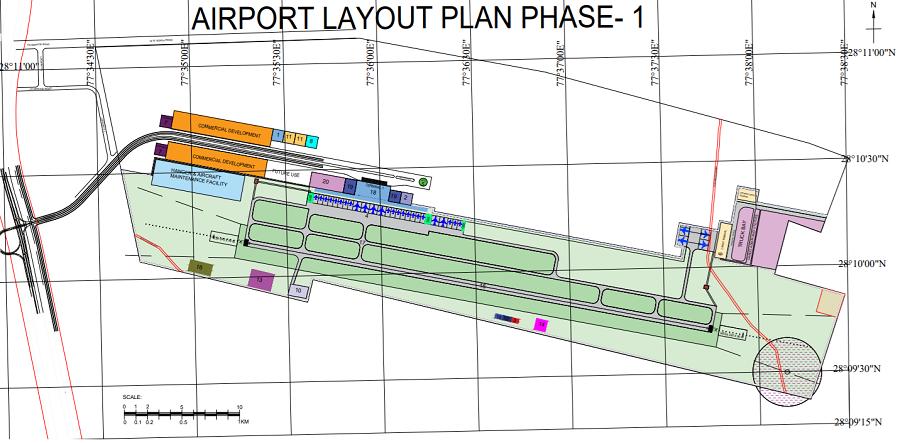 Jewar Airport Layout Phase 1
Jewar Airport Layout Phase 1
Source: The Metro Rail Guy
- Terminal 1 Building: The focal point of Phase 1 is the construction of a spacious Terminal 1 building spanning an area of 90,000 square meters. This terminal will serve as the primary gateway for passengers, offering modern facilities and amenities to ensure a seamless travel experience.
- Runway and Approach Infrastructure: The airport will feature a Code 'E' runway measuring 4150 x 45 meters (Runway 10/28) equipped with CAT III approach lighting and visual aids. These advanced systems are crucial for safe landings and takeoffs, especially during adverse weather conditions.
- Taxiway and Air Traffic Control (ATC): A parallel end-to-end taxiway will complement the runway, facilitating efficient aircraft movements. An Air Traffic Control (ATC) building will oversee and manage flight operations, ensuring smooth coordination between ground and air activities.
- Cargo Facility: Phase 1 includes the development of a dedicated cargo facility to handle freight operations, supporting the logistics and transportation needs of the region.
- Commercial Developments: The airport complex will host commercial spaces, including retail outlets, dining establishments, and other services, enhancing convenience for passengers and visitors alike.
- Transportation Connectivity: To promote seamless connectivity, Phase 1 incorporates provisions for metro and high-speed rail stations within the airport vicinity. These transportation links will facilitate easy access for travelers from various parts of the region.
- Other Amenities: In addition to essential infrastructure, Phase 1 will focus on providing essential amenities such as parking facilities, lounges, and passenger services to meet the diverse needs of airport users.
Jewar Airport Noida Phase 2 Layout Plan
Phase 2 of Noida International Airport represents a significant expansion and enhancement of the airport's infrastructure and capabilities. It is designed to mirror the developments achieved in Phase 1 while introducing new elements to meet growing aviation demands. Here's an overview of the Phase 2 layout plan:
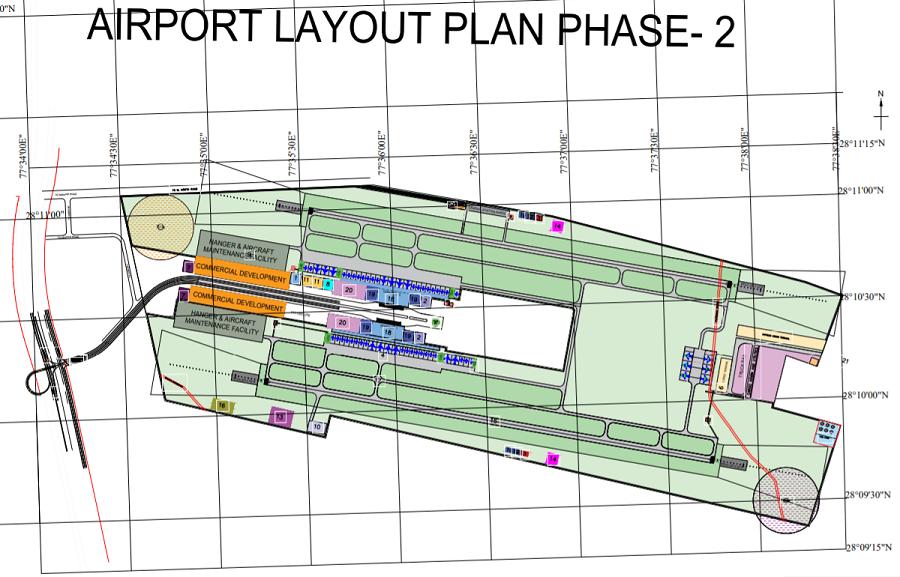 Jewar Airport Layout Phase 2
Jewar Airport Layout Phase 2
Source: The Metro Rail Guy
- Terminal 2 Development: Phase 2 will see the construction of a new Terminal 2 building, mirroring the design and functionality of Terminal 1. This addition is essential to accommodate the increasing passenger traffic and provide additional capacity for airlines and related services.
- New Runway and Parallel Taxiway: To support the expanded operations, Phase 2 includes the construction of a new runway and parallel taxiway system. These additions will optimize aircraft movements, reduce congestion, and enhance overall operational efficiency.
- Advanced Infrastructure: The new runway and taxiway will be equipped with state-of-the-art navigation and safety systems, including advanced lighting, markings, and guidance technologies. These enhancements will ensure safe and reliable aircraft operations, especially during peak traffic periods and adverse weather conditions.
- Terminal 2 Facilities: Similar to Terminal 1, Terminal 2 will feature modern passenger amenities, check-in counters, security screening areas, boarding gates, lounges, and retail outlets. The design will prioritize passenger comfort, convenience, and efficient processing to deliver a world-class travel experience.
- Expanded Cargo and Commercial Zones: Phase 2 will also include the expansion of cargo handling facilities to support increased freight operations. Additionally, commercial zones within the airport complex will be enhanced to offer a diverse range of retail, dining, and service options for passengers, visitors, and airport staff.
- Transportation and Connectivity: Efforts will continue to improve transportation connectivity, including potential expansions or enhancements to metro and high-speed rail services. These connectivity initiatives aim to facilitate seamless access to and from the airport, promoting regional integration and accessibility.
- Sustainability and Environmental Considerations: Phase 2 will integrate sustainable practices and environmental considerations into its development, focusing on energy efficiency, waste management, and eco-friendly design principles. This approach aligns with global aviation industry standards and promotes responsible airport operations.
Jewar Airport Noida Phase 3 Layout Plan
Phase 3 of Noida International Airport marks a significant leap forward in its development, focusing on expansive infrastructure and operational enhancements to meet future aviation demands. Here's an overview of the Phase 3 layout plan:
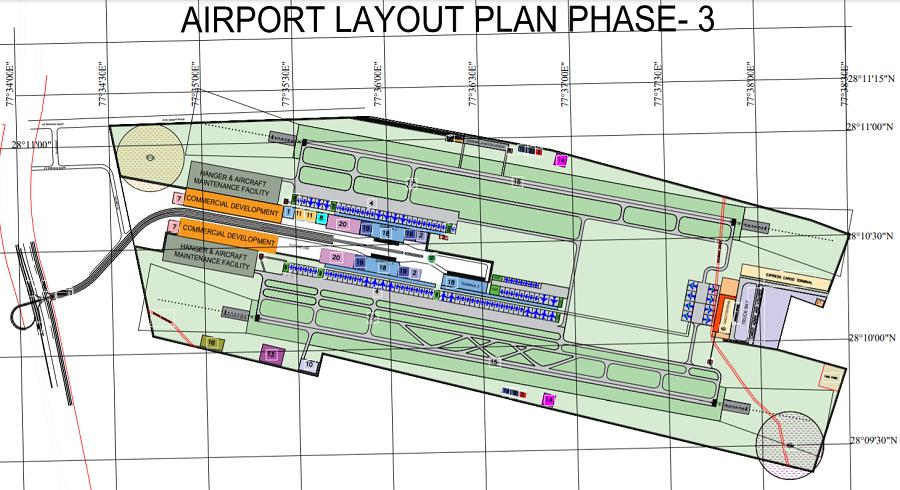 Jewar Airport Layout Phase 3
Jewar Airport Layout Phase 3
Source: The Metro Rail Guy
- Terminal 3 Development: Phase 3 will introduce a state-of-the-art Terminal 3, covering an expansive area of 1,60,000 square meters. This terminal will be designed to accommodate a substantial increase in passenger traffic, offering cutting-edge facilities and services to meet the evolving needs of travelers.
- New Parallel Taxiway and CAT III Operations: A new second parallel taxiway will be constructed, conforming to Code F standards and equipped to support CAT III operations. This taxiway configuration is crucial for handling larger aircraft and facilitating efficient movements, especially during low-visibility conditions.
- Rapid Exit Taxiways: The addition of three rapid exit taxiways will enhance aircraft taxiing capabilities, allowing for quicker turnarounds and reducing runway occupancy times. These taxiways are strategically positioned to optimize traffic flow and operational efficiency.
- Apron Expansion: Phase 3 includes a significant expansion of the airport apron, adding 37 additional aircraft parking bays. This expansion caters to the growing demand for aircraft parking and servicing, supporting the increased number of flights and airlines operating from the airport.
- Terminal 3 Facilities: Terminal 3 will feature an array of advanced facilities, including spacious check-in areas, security screening zones, immigration counters, boarding gates, lounges, and retail outlets. The design will prioritize passenger comfort, convenience, and seamless connectivity within the terminal complex.
- Technology and Automation: Phase 3 will leverage cutting-edge technologies and automation systems to enhance airport operations, including baggage handling, security screening, and passenger flow management. These technological advancements will streamline processes and improve overall efficiency.
- Environmental Sustainability: As with previous phases, Phase 3 will integrate sustainable practices into its development, focusing on energy-efficient building designs, waste management systems, and green initiatives. The aim is to minimize environmental impact while ensuring long-term operational sustainability.
- Collaborative Partnerships: The successful implementation of Phase 3 will rely on collaborative partnerships with industry stakeholders, government agencies, airlines, and technology providers. These partnerships will facilitate seamless project execution and ensure alignment with industry best practices.
Jewar Airport Noida Phase 4 Master Plan
Phase 4 of Noida International Airport represents the culmination of its master plan, incorporating strategic developments to further elevate its capabilities and services. Here's an overview of the Phase 4 master plan:
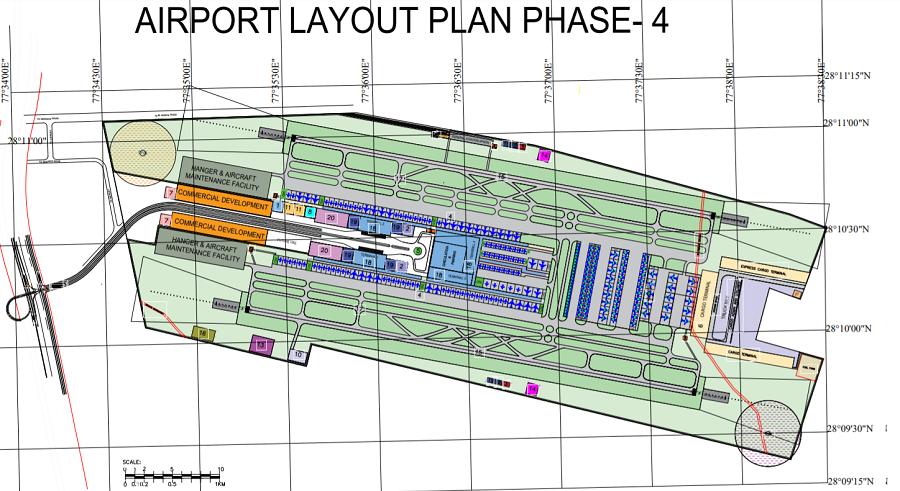 Jewar Airport Layout Phase 4
Jewar Airport Layout Phase 4
Source: The Metro Rail Guy
Terminal 4 Development: The final phase introduces Terminal 4, spanning an impressive area of 1,60,000 square meters. This terminal will be designed with cutting-edge architecture and passenger-centric amenities to accommodate the increasing air travel demands effectively.
Cargo Terminal Expansion: Phase 4 includes a significant expansion of the cargo terminal, increasing its capacity to 1,50,000 square meters. This expansion is crucial to support the growing volume of freight operations, enhancing logistics capabilities and facilitating seamless cargo handling processes.
Apron Expansion and Additional Bays: The airport's apron will undergo expansion to accommodate 25 additional aircraft parking bays. This expansion is essential to meet the rising demand for aircraft parking and maintenance services, ensuring efficient operations and reduced turnaround times.
Rapid Exit Taxiways and Parallel Taxiway Enhancement: Three rapid exit taxiways will be implemented on the northern runway, enhancing taxiing efficiency and runway utilization. Additionally, a second parallel taxiway conforming to Code F standards for CAT III operations will be developed, further optimizing aircraft movements and enhancing safety protocols.
Terminal 4 Facilities: Terminal 4 will offer a comprehensive range of facilities and services, including advanced check-in counters, security screening areas, immigration facilities, boarding gates, lounges, and commercial outlets. The terminal's design will prioritize passenger comfort, convenience, and seamless connectivity within the airport complex.
Technology Integration: Phase 4 will integrate state-of-the-art technologies and automation systems across terminal operations, cargo handling, and aircraft servicing areas. This integration aims to enhance operational efficiency, reduce wait times, and improve overall passenger experience through digital innovations and smart infrastructure.
Sustainability Initiatives: Environmental sustainability will remain a key focus in Phase 4, with initiatives such as energy-efficient building designs, renewable energy adoption, waste management systems, and eco-friendly practices. These initiatives align with global sustainability standards and contribute to the airport's commitment to environmental stewardship.
Collaborative Partnerships and Stakeholder Engagement: Successful implementation of Phase 4 will require collaborative partnerships with aviation industry stakeholders, regulatory authorities, airlines, technology providers, and local communities. Engaging stakeholders effectively will ensure smooth project execution, regulatory compliance, and alignment with industry best practices.
Jewar Airport Noida Receives IATA Code 'DXN'
Jewar Airport, located near Greater Noida, has received its official IATA code of 'DXN' from the International Air Transport Association (IATA). This three-letter code is a significant step in the airport's development, as it plays a crucial role in identifying the airport for airlines, passengers, and various aviation-related operations.
The assignment of IATA codes to airports is a standard practice by IATA to ensure unambiguous identification globally. The code 'DXN' for Jewar Airport will be used in passengers' travel documents, flight schedules, ticketing systems, baggage handling procedures, and other communications related to air travel.
The construction and development of Jewar Airport are overseen by Zurich Airport, Switzerland, known for its expertise in aviation infrastructure. This collaboration aims to blend Indian hospitality and culture with Swiss technology, creating a modern and user-friendly airport experience for travelers.
Tata Projects, a leading engineering and construction company, has been entrusted with the responsibility of executing the airport's engineering, procurement, and construction (EPC) tasks. Currently, construction work, including runway development, is progressing with around 7,000 workers dedicated to the project.
The airport's completion is anticipated by the end of 2024, marking a significant milestone in enhancing air connectivity and infrastructure in the NCR region. Jewar Airport's development reflects a concerted effort to create a world-class aviation facility that meets international standards while showcasing India's rich cultural heritage and technological advancements.
Jewar Airport Noida to be India's Largest Six-Runway Hub
The Jewar Project Report, endorsed by Chief Minister Yogi Adityanath, lays out an ambitious vision for Noida International Airport. Upon completion of all planned expansions, the airport is slated to become India's largest aviation hub. One of the key highlights of this expansion is the inclusion of six runways, a significant leap in infrastructure that underlines the airport's scale and capacity.
The strategic foresight of the project includes provisions for further growth, contemplating the addition of two more runways in the future. This expansion strategy is contingent upon the availability of adequate land, demonstrating a flexible and adaptive approach to meet evolving aviation demands.
Upon achieving its full operational capacity, Jewar International Airport will not only be the largest airport in India but will also secure its position as the world's fourth-largest airport in terms of runway infrastructure. This milestone underscores India's commitment to modernizing its air transportation infrastructure and accommodating the growing needs of domestic and international air travel.
Jewar Airport Noida: Investing in Plots
Investing in plots near Jewar Airport in Noida presents a compelling opportunity for various reasons:
- Enhanced Infrastructure: The development of Jewar Airport will significantly enhance connectivity and lead to infrastructural upgrades in the region. This will make the area more livable and active, attracting real estate developments and investments. First-time homebuyers can seize the opportunity to invest in affordable properties before the market gains momentum with expert realtors and investors stepping in.
- Long-Term Appreciation: Jewar Airport's strategic connectivity plans with multiple expressways, national highways, and metro lines make it an attractive investment destination. Such developments historically result in profitable returns for investors. With the airport set to become operational soon, the area is poised for genuine and steady capital appreciation over the long term.
- Commercial Development: The surge in housing demand due to Jewar Airport's construction will also spur commercial developments. This includes retail spaces and offices, offering profitable opportunities for investors in plots near the airport. These commercial spaces are expected to cater to the growing needs of the population, with rental rates likely to be lower than Delhi and Gurgaon but without compromising on amenities.
- Boost to Tourism: The upcoming Noida International Airport will not only enhance connectivity but also increase tourist footfall in Jewar, Agra, Mathura, and other nearby cities. These cities are well-connected to Noida via the Yamuna Expressway, further amplifying the potential for tourism-driven economic growth. The positive impact on the tourism sector is expected to have a ripple effect on the real estate market, creating opportunities for investors and developers alike.
YEIDA's Plan for Aerotropolis near Jewar Airport
The Uttar Pradesh government, in collaboration with YEIDA (Yamuna Expressway Industrial Development Authority), is set to construct an Aerotropolis near Jewar Airport, aiming to catalyze growth in the commercial and residential real estate sectors. Here are the key details:
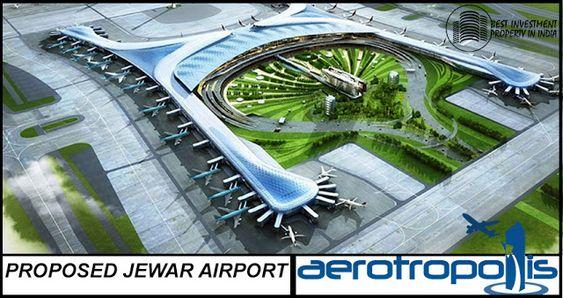 Proposed Jewar Airport Aerotropolis
Proposed Jewar Airport Aerotropolis
Image source: Pinterest
Boosting Real Estate Sector:
- The Aerotropolis project is envisioned to significantly boost the commercial and residential real estate segments around Jewar Airport.
- This development is expected to attract investors from across India, leveraging the strategic location and infrastructure of the airport.
Components of Aerotropolis:
- The Aerotropolis will feature a dynamic Innovation and Technology Hub, designed to foster innovation and technological advancements.
- It will also include commercial centers, a robust logistics hub to support trade and logistics operations, various hospitality options to cater to travelers and visitors, and vibrant recreational and entertainment areas for residents and tourists alike.
Inception and Height Restrictions:
- The concept of the Aerotropolis hub was first introduced in the Noida Master Plan 2041, highlighting its long-term strategic vision.
- However, buildings constructed in the vicinity of Jewar Airport will be subject to a height restriction of 20 meters as mandated by the Airports Authority of India (AAI).
- This height restriction aims to promote extensive ground-level development while ensuring safety and operational efficiency for air traffic.
Top Hotels Near Jewar Airport Noida
Here are some of the top hotels near Jewar Airport in Noida:
Hotel Aarush
- Address: 1738, Sikandrabad-Jewar Road, Noida, Uttar Pradesh 203203
- Google Rating: 4.3
Hotel JP Velvet
- Address: Khurja Road, Jewar, Uttar Pradesh 203135
- Google Rating: 4.0
Hotel Green
- Address: Near Indusind Bank, Khurja Road, Jewar, Noida, Uttar Pradesh 203135
- Google Rating: 4.0
FabHotel A&V Hospitality
- Address: C93, Block C, Sector 108, Noida, Uttar Pradesh 201304
- Google Rating: 3.9
Riverview Resort & Restaurant
- Address: Plot No 100A, Namoll Knowledge Park III, Greater Noida, Noida, Uttar Pradesh 203203
- Google Rating: 3.9
Contact Information for Jewar International Airport
For any inquiries or support regarding Noida International Airport, you can reach out to the help and support team using the following contact details:
- Email Address: Info@nlaljewar.com
- Contact Number: 0120 2395151
- Administrative Office Address: Office No. 1-15, Block P-2, Sector OMEGA -1, Greater Noida, Gautam Buddha Nagar, Uttar Pradesh, India, 201308
Conclusion
The upcoming operationalization of Jewar International Airport in Noida heralds a new era of connectivity, economic vitality, and infrastructural advancement for the region and the nation at large. With its ambitious plans for expansion, including six runways and modern facilities, Jewar Airport is set to become a crucial gateway for business, tourism, and logistics. The comprehensive connectivity solutions, ranging from highways to metro corridors, ensure seamless access for passengers and cargo, contributing to smoother travel experiences and efficient trade routes.
Moreover, the collaborative efforts between government entities, private investors, and international partners underscore the project's scale and commitment to excellence. As Jewar Airport progresses towards its operational phases, it is not just an airport but a symbol of India's commitment to modernizing its aviation infrastructure and embracing global standards. The ripple effects of Jewar Airport's development are expected to positively impact various sectors, from real estate and hospitality to trade and technology, positioning it as a pivotal hub in India's evolving aviation landscape.
explore further
Latest from Editorials
More from Publications
Resources
Dwello, for every home buyer, is a way to go from 'I feel' to 'I know', at no extra cost.


